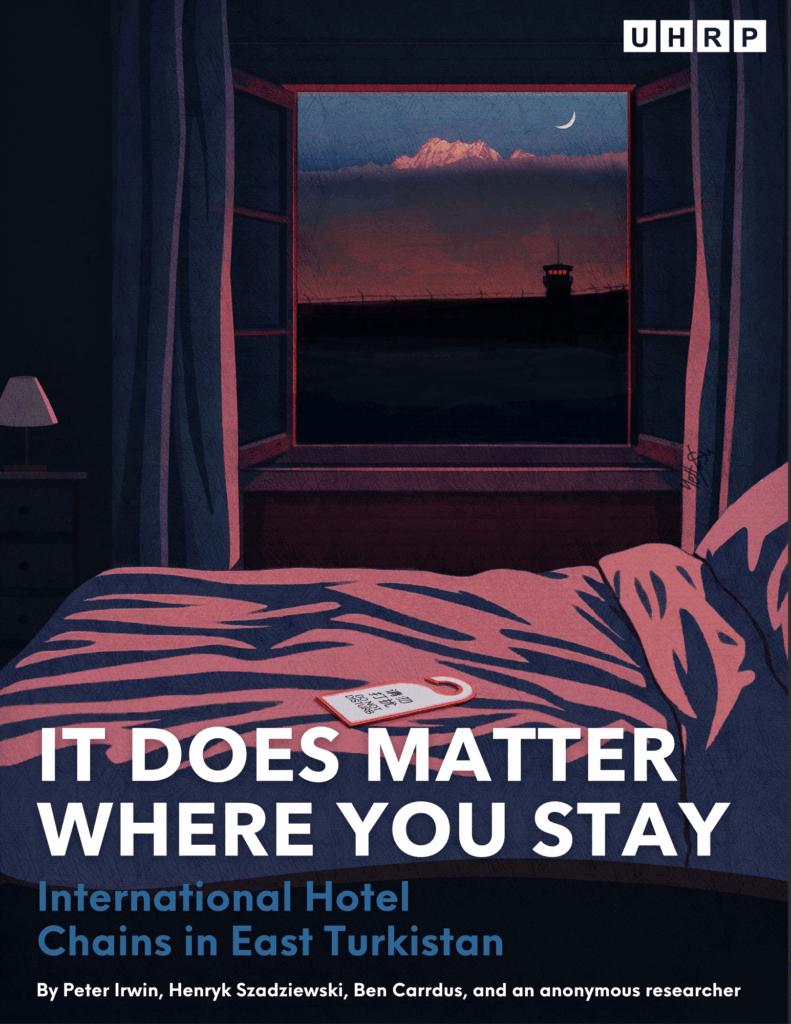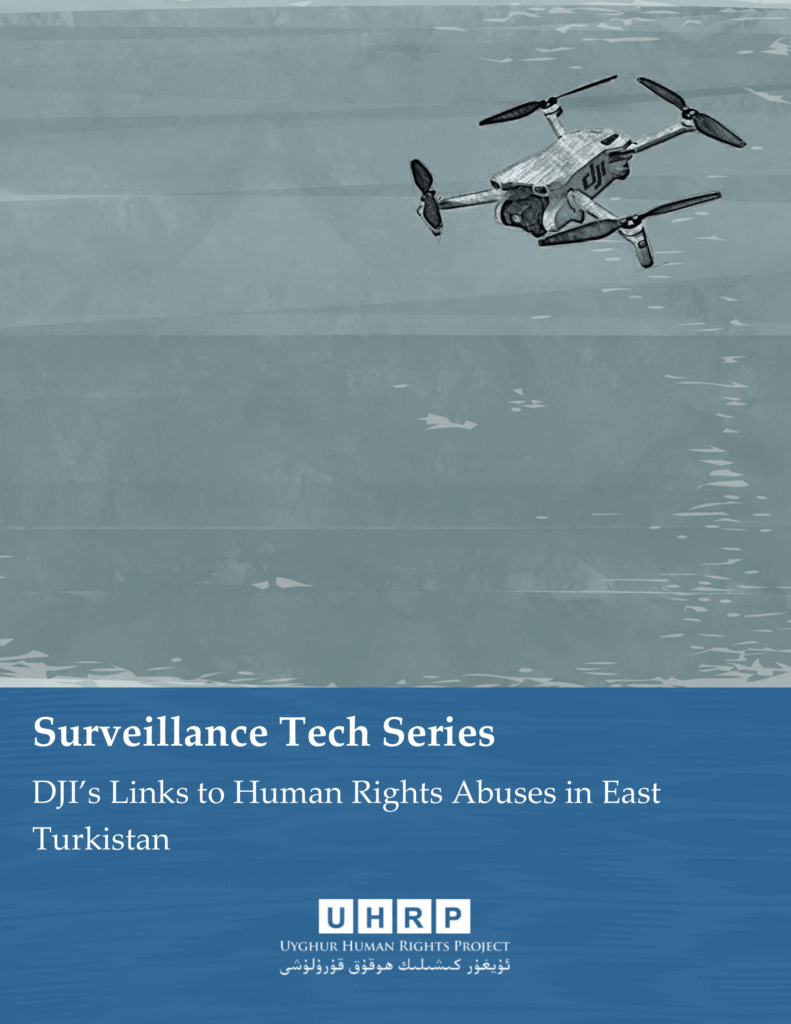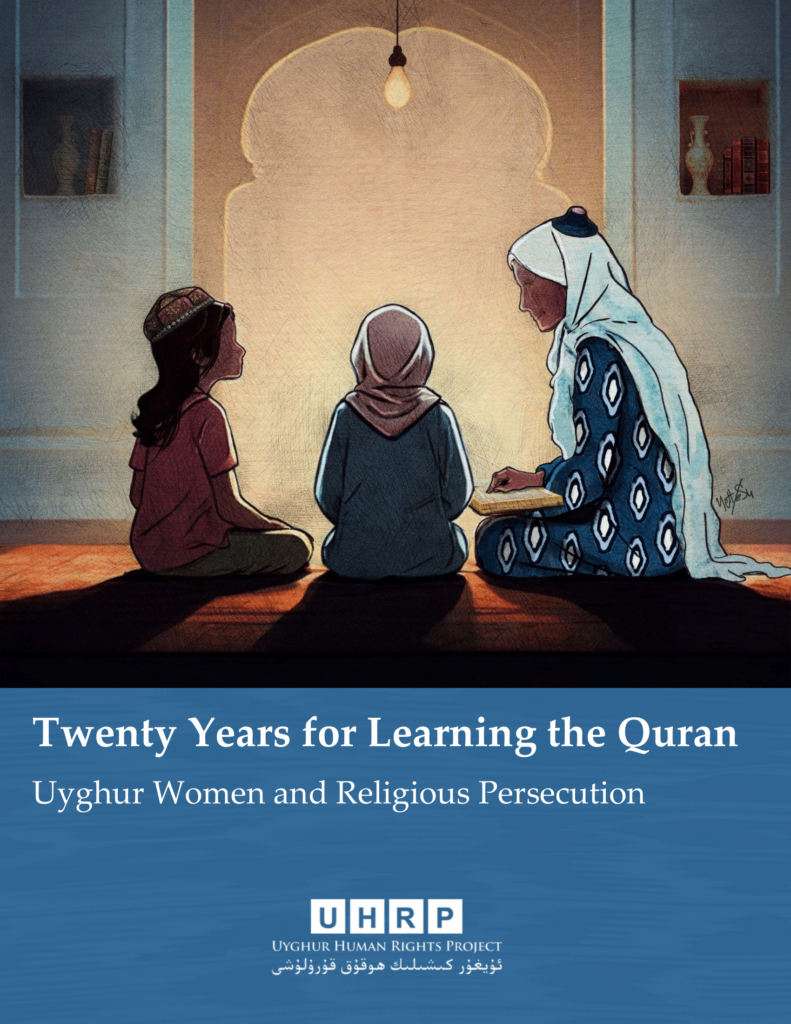A Uyghur Human Rights Project report by Nicole Morgret. Read our press statement on the report here, and download the full report in here.
Read exclusive coverage of the report in The Wall Street Journal.

I. Executive Summary
UHRP has discovered judicial auctions of property belonging to imprisoned Uyghur businesspeople listed on the e-commerce website Taobao, owned by the Alibaba Group. The judicial auctions section of the Taobao website includes auctions of property seized in criminal cases alongside auctions of collateral on defaulted loans. The individuals whose cases we present in this report have been imprisoned on politicized charges of “terrorism” and “extremism” (or some variation thereof) in a highly secretive process of arrest and trial that appears to fall outside judicial due process, in violation of China’s own laws.
This report presents twelve cases of imprisoned Uyghurs whose property has been auctioned on the judicial auction platform of Taobao. Five of these cases involve Uyghur businesspeople whose arrests have been reported in publicly available sources. The other seven cases are of Uyghurs whose arrests on politicized charges have not been previously reported. Given the scale of the arrests and mass detention taking place in East Turkistan, this dataset likely represents only a fraction of the property dispossession occurring in the government crackdown on Uyghurs and other Turkic peoples in the region, which began in earnest in 2016.
Emerging evidence suggests that numerous Uyghur businesspeople have been swept up in the ongoing crackdown—and that some have been placed in the formal prison system on spurious charges of “terrorism” and “extremism.” Chinese authorities in the Uyghur Region are likely targeting businesspeople as members of the social elite, a group that also includes intellectuals and religious leaders. The government perceives these groups as a threat to Party and state authority due to their status outside of official institutions and their role in maintaining Uyghur culture.
These judicial auctions represent further evidence of the scope of the crackdown on Uyghur society, as well as the speed and lack of due process with which the campaign is taking place. The Chinese government has not disclosed any details of the cases appearing in this report, and in most cases has not revealed the arrest of the individuals involved. These cases demonstrate the secrecy with which the government is trying and imprisoning people in the Uyghur Region.
Our findings raise troubling questions that warrant further research and scrutiny, including
- The rate of incarceration in the formal prison system of Uyghurs and other Turkic peoples who have been targeted in the Chinese government’s campaign of repression;
- The lack of transparency in judicial record-keeping, as well as the general secrecy surrounding the judicial process to which Uyghurs are subjected; and
- The degree to which the Alibaba Group is complicit in the dispossession of Uyghurs in the ongoing crackdown, which should be of grave concern to international investors and relevant international oversight institutions.

II. Introduction
Many Uyghurs take pride in a reputation throughout Central Asia for their business acumen and entrepreneurial spirit. In contrast, Chinese government narratives prefer to frame Uyghurs as “impoverished” due to a “backwards” culture, in need of the leadership of the CCP to transform them into a productive industrial workforce so they can “get rich.” This latter point is repeated ad nauseum in official government messaging, including in the justifications the Chinese government has leveled following the international outcry over a widespread and deeply entrenched system of Uyghur forced labor.1For just one example, see Ministry of Foreign Affairs of the People’s Republic of China, “The 10th Press Conference by Xinjiang Uygur Autonomous Region on Xinjiang-related Issues in Beijing,” Embassy of the People’s Republic of China in the Republic of Azerbaijan, June 9, 2021, http://az.china-embassy.org/eng/sgxw/t1882521.htm
The ongoing crackdown in East Turkistan, which began in 2016 with the accession to office of Party Secretary Chen Quanguo, has featured a broad attack on the elite of Uyghur society.2Uyghur Human Rights Project, “The Mass Internment of Uyghurs: ‘We want to be respected as humans. Is it too much to ask?’”, August 23, 2018, https://docs.uhrp.org/pdf/MassDetention_of_Uyghurs.pdf UHRP has written extensively on the targeting of Uyghur intellectuals due to their role in maintaining and innovating Uyghur culture, as well as religious leaders, who are a major target in the government’s attempts to purge Uyghur society of Islam.3Uyghur Human Rights Project, “Detained and Disappeared: Intellectuals Under Assault in the Uyghur Homeland,” March 25, 2019, https://uhrp.org/statement/uhrp-update-detained-and-disappeared-intellectuals-under-assault-in-the-uyghur-homeland/; Uyghur Human Rights Project, “Islam Dispossessed: China’s Persecution of Uyghur Imams and Religious Figures,” May 13, 2021, https://uhrp.org/report/islam-dispossessed-chinas-persecution-of-uyghur-imams-and-religious-figures/ This report focuses on an under-discussed segment of Uyghur society that has also been severely impacted by the campaign of detention and imprisonment: businesspeople.
The ongoing crackdown in East Turkistan, which began in 2016 with the accession to office of Party Secretary Chen Quanguo, has featured a broad attack on the elite of Uyghur society.
Successful Uyghur businesspeople have long been targets of the government. The most famous example remains that of Rebiya Kadeer.4Kadeer Rebiya and Cavelius Alexandra, Dragon Fighter: One woman’s epic struggle for peace with China, (England: Kales Press, 2009). During the first decades of reform and opening, she developed an extremely successful trading company, at one point becoming one of the seven wealthiest people in the People’s Republic of China (PRC). She made efforts to raise the fortunes of fellow Uyghurs through efforts such as the “Thousand Mothers Movement,” which empowered Uyghur women to start their own businesses, along with other philanthropic initiatives. Initially upheld as a success story by the government and made a member of the Chinese People’s Political Consultative Conference (CPPCC), Ms. Rebiya5Uyghur naming conventions depart from those used widely in English-speaking countries. The majority of Uyghur surnames are patronyms (i.e., the father’s first name) rather than family names passed from one generation to another. Husbands and wives do not share last names; similarly, children in a single family generally share the same last name (their father’s first name) but not the last name of either parent. Uyghurs would refer to Rebiya Kadeer not as “Ms. Kadeer,” as is customary in the English-speaking world, but instead by attaching an honorific or title such as “Ms.” or “Mother” to her first name, e.g., “Ms. Rebiya” or “Mother Rebiya.” For this reason, UHRP chooses to refer to Uyghurs in our research reports by their first, rather than last, names upon subsequent reference, hence “Ms. Rebiya” or simply “Rebiya.” was arrested in 1999 on allegations of “leaking state secrets” and later released to the United States on medical parole in 2005.
The Xinjiang Production and Construction Corps (XPCC) domination of resource-extraction industries and other business, along with entrenched systematic discrimination, has meant that Uyghurs have had to create their own business opportunities, despite the challenges in doing so.6Tyler Harlan, “Private Sector Development in Xinjiang, China: A Comparison between Uyghur and Han,” Espace populations sociétés, 2009/3 (2009): 407–18. Parts of Rebiya Kadeer’s story are typical of successful Uyghur businesspeople; wealthy Uyghurs often took up philanthropic works serving the Uyghur community, becoming unofficial leaders in Uyghur society. It now appears that they are being targeted for this very reason in an unprecedented sweeping crackdown.

III. Sources and Methodology
This report discusses the twelve cases of Uyghur businesspeople whose property has appeared on the judicial auction section of Taobao, the e-commerce website owned by Alibaba Group, one of China’s largest tech and online retail companies. In 2012, the Chinese judicial system began using Taobao as a platform for auctioning off property serving as collateral for delinquent loans, as well as a smaller amount of property seized in criminal cases.7Dinny McMahon, “Returning to Its Roots: The Role of Taobao Auctions in Resolving Delinquent Loans,” Macro Polo, July 25, 2018, https://macropolo.org/cleanup_analysis/returning-to-its-roots/ The majority of the properties on Taobao are auctioned by the judicial system over loan defaults or civil disputes. A smaller number of auctions on the site are of property that has been seized in criminal cases. Very few of properties auctioned by Xinjiang Uyghur Autonomous Region (XUAR) courts include official documentation revealing the nature of the property owners’ alleged crime.8Uyghurs use “East Turkistan” and sometimes “Uyghur Region” to denote their homeland. The Chinese government refers to the same land as the “Xinjiang Uyghur Autonomous Region” (XUAR), or “Xinjiang” for short. UHRP uses “East Turkistan” and “Uyghur Region” interchangeably when referring to the region. We also use “XUAR” in some places to denote formal titles, institutions, and the means of governance in the region.
In a systematic search of the available records on Taobao, UHRP found twelve cases ranging from 2018 to 2021 in which property belonging to Uyghur businesspeople in East Turkistan has been put up for auction following the imprisonment of these individuals on politicized criminal charges such as “aiding terrorist activities” and “extremism.” The definition of “terrorism” is vague in the Chinese legal system, as are the laws aimed at punishing it.9Uyghur Human Rights Project, “Briefing: China’s New Counter-Terrorism Law and Its Human Rights Implications for the Uyghur People,” February 1, 2016, https://docs.uhrp.org/pdf/BRIEFING-%20China’s%20New%20Counter-Terrorism%20Law%20and%20Its%20Human%20Rights%20Implications%20for%20the%20Uyghur%20People.pdf.; Uyghur Human Rights Project, “Briefing: The New Implementation Guidelines for the CounterTerrorism Law in East Turkestan Will Reinforce Government’s Curbs on Human Rights,” September 26, 2016, https://docs.uhrp.org/pdf/CounterTerrorBriefing.pdf Charges like these are often levied against Uyghurs and other Turkic Muslim people based on innocuous behavior like traveling or sending money abroad or engaging in mainstream religious practice. For these reasons, we believe these charges are spurious.
These cases we describe in this report are a rare source of evidence for the broad and wide-sweeping ramifications of the crackdown in the region, which human-rights watchdogs, legal experts, and national governments have begun to recognize as genocide.10Newlines Institute and the Raoul Wallenberg Centre for Human Rights, “The Uyghur Genocide: An Examination of China’s Breaches of the 1948 Genocide Convention,” March 1, 2021, https://newlinesinstitute.org/wp-content/uploads/Chinas-Breaches-of-the-GC3.pdf; Alison Macdonald QC, Jackie McArthur, Naomi Hart, Lorraine Aboagye, “International Criminal Responsibility for Crimes against Humanity and Genocide against the Uyghur Population in the Xinjiang Uyghur Autonomous Region,” Essex Court Chambers, January 26, 2021, https://14ee1ae3-14ee-4012-91cf-a6a3b7dc3d8b.usrfiles.com/ugd/14ee1a_3f31c56ca64a461592ffc2690c9bb737.pdf; UK Parliament House of Commons, “Human Rights: Xinjiang Volume 692: debated on Thursday 22 April 2021,” April 22, 2021, https://hansard.parliament.uk/commons/2021-04-22/debates/6FA4F300-D244-443E-A48C-57378876DE54/HumanRightsXinjiang; Parliament of Canada House of Commons, “Vote No. 56 43rd Parliament, 2nd Session,” February 22, 2021, https://www.ourcommons.ca/members/en/votes/43/2/56; Michael R. Pompeo, “Determination of the Secretary of State on Atrocities in Xinjiang,” U.S. Department of State, January 19, 2021, https://2017-2021.state.gov/determination-of-the-secretary-of-state-on-atrocities-in-xinjiang/index.html This genocidal context makes this evidence of the dispossession of Uyghurs particularly disturbing. Seizure of property has been a feature of genocides throughout history.11Uğur Üngör, “Genocide and Property: Root Cause or Concomitant Effect?” in Genocide, Risk and Resilience: An Interdisciplinary Approach (London, Palgrave Macmillan, 2013), 178–89.
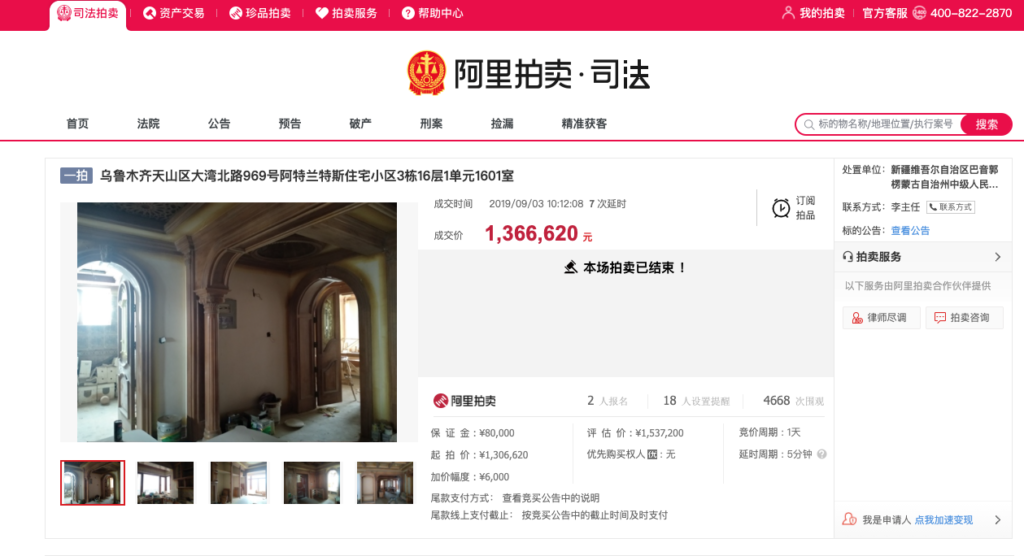
Each of these auctions was conducted by the court in which the trial or legal action took place. Most of the auctions in this report were conducted by the Lop County People’s Court in Hotan prefecture. While these auctions do not give us a comprehensive picture of what is happening to members of the Uyghur business community, they do provide a glimpse into an underreported aspect of the ongoing repression in the region. The crackdown on the Uyghur population takes not only the form of extrajudicial detention, but also formal imprisonment, often for 10 or more years, on spurious and politicized charges. A number of wealthy and prominent Uyghurs, particularly in the cities of Hotan and Kashgar, appear to have suffered precisely this fate.
This genocidal context makes this evidence of the dispossession of Uyghurs particularly disturbing. Seizure of property has been a feature of genocides throughout history.
The auctions state the name of the individual or company against which the judicial action has been taken. Most auctions also include a case number indicating the court, year and case type. A property appraisal is attached as a PDF, sometimes together with a court order document (法院执行裁定书) explaining the reasons for the seizure and disposal of the convicted individuals’ property. Some of these court orders include additional information indicating whether the case is of a civil (民事) or criminal (刑事) nature, sometimes explicitly stating that the individuals have been sentenced for “aiding terrorist activities.” Others do not reveal the charges against the individual. Some refer to the impoundment period of the seized property, saying it will be auctioned if the person under legal action does not fulfill their “legal obligations.”12 “执行裁定书(2018)新3224执248号” [Enforcement Ruling (2018) Xinjiang 3224 Initial Enforcement Case No. 248], Xinjiang Uyghur Autonomous Region Lop County People’s Court, June 29, 2018, archived here. We are not entirely certain what the term “legal obligations” means, though we suspect it may refer to court fines. Other documents list specific properties. UHRP used these court documents to identify cases of individuals who have been imprisoned on politicized charges.
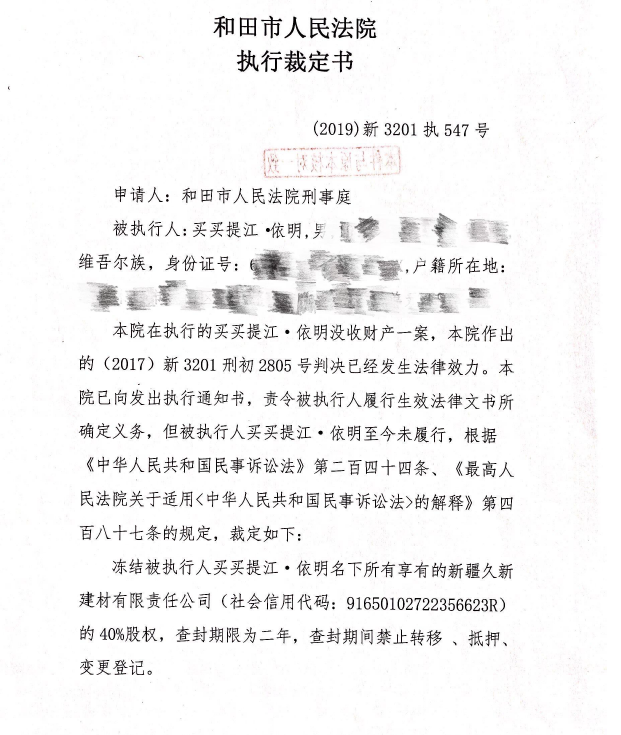
We have also utilized the online judicial records database China Judgments Online (中国裁判文书网), which we cross-referenced with judicial records and business registrations gathered by C4ADS (Center for Advanced Defense Studies). China Judgments Online, which went live in 2014, is the Supreme People’s Court database of criminal, civil, and administrative judgments and enforcement rulings. Records have been inconsistently uploaded to the system since then. Courts do not always comply with the disclosure requirements, and records are sometimes removed from the database.13Benjamin Liebman, Margaret Roberts, Rachel Stern, and Alice Wang, “Mass Digitization of Chinese Court Decisions: How to Use Text as Data in the Field of Chinese Law,” Journal of Law & Courts 8 (2020), p. 177. The rules for the release of these records include exceptions for cases involving state secrets, or those simply deemed “inappropriate” to release by court officials; although officials are required to explain their reasons for withholding records, they often fail to do so.14Mimi Lau and Echo Xie, “How China’s supreme court tried to open up the legal ‘black box’ to let in the light,” South China Morning Post, March 26, 2021, https://www.scmp.com/news/china/politics/article/3127001/how-chinas-supreme-court-tried-open-legal-black-box-let-lightIn July 2021, all cases involving “endangering state security” were purged from the database.15Duihua Foundation, “China: All State Security Judgments Purged from Supreme Court Site,” July 26, 2021, https://www.duihuahrjournal.org/2021/07/china-all-state-security-judgments.html
The Chinese government has maintained secrecy in the mass detention and imprisonment campaign taking place in the Uyghur Region, including in the arrests and trials of most of the individuals who appear in this report. Given the sweeping definitions the Chinese state employs in matters of national security, China Judgments Online is of limited utility when attempting to discover what is happening to Uyghurs who have disappeared into state custody. UHRP searched the database for court documents relating to each individual appearing in this report. In most cases, we were unable to find any results, demonstrating the secrecy surrounding the proceedings of XUAR courts.
In an essay investigating mass incarceration in the Uyghur Region, Gene Bunin notes that the region not only has a disproportionate number of arrests but is also “order of magnitude ahead when it comes to not disclosing the information.” He points out that of the 74,348 criminal cases concluded by XUAR courts in 2018, only 7,714 verdicts were available in China Judgments Online. Bunin also notes that of these, fewer than one percent involve the politicized charges levied against Uyghurs such as “terrorism” or “extremism,” suggesting that many of the records are missing.16Gene Bunin, “The Elephant in the XUAR: III. ‘In accordance with the law’,” Art of Life in Chinese Central Asia, April 19, 2021, https://livingotherwise.com/2021/04/19/the-elephant-in-the-xuar-iii-in-accordance-with-the-law/ Cases of Uyghurs known to have been sentenced on terrorism charges through information obtained by their relatives, as well as the terrorism cases presented in this report, are all missing from the database. The large numbers of Uyghurs who appear to have been transferred into the prison system from extrajudicial detention give us reason to believe that there are many more such cases. This context demonstrates how unusual it is to find official documentation publicly revealing sensitive legal allegations against Uyghurs. This means that the judicial documents attached to Taobao auctions we uncovered are a particularly valuable source of difficult-to-find information.
The broad and consistent accusations against wealthy Uyghur businesspeople of “aiding terrorism” or “helping terrorist activities” seem absurd given the secrecy of their trials and the seizure of their property by the state.
The first five cases presented in this report involve prominent Uyghur businesspeople whose imprisonment has been publicly reported, mostly from information obtained by journalists from relatives abroad. Chinese media has publicly mentioned the arrests of only two of these individuals. The last seven cases were discovered by UHRP on the Taobao auction website, using the court documents describing their alleged crimes as “aiding terrorism” and related charges. In many cases we were able to obtain only limited information about these individuals from the judicial auctions website and China Judgments Online. To supplement these materials, we conducted three interviews with relatives of the imprisoned businesspeople; all of these relatives reside outside East Turkistan.
The broad and consistent accusations against wealthy Uyghur businesspeople of “aiding terrorism” or “helping terrorist activities” seem absurd given the secrecy of their trials and the seizure of their property by the state. One reason for charges of “helping terrorist activities” is sending or receiving money from abroad, a regular occurrence during normal business. Many of the individuals described in this report traveled to nations on a XUAR government list of sensitive countries, another potential reason for terror or extremism charges.17In 2016, XUAR authorities issued a list of 26 Muslim majority countries. The authorities investigate and often detain any Uyghur who has a connection to these countries; a “connection” might including past travel, communication, or relationship to someone residing in one. See Human Rights Watch, “‘Eradicating Ideological Viruses’: China’s Campaign of Repression Against Xinjiang’s Muslims,” September 9, 2018, https://www.hrw.org/report/2018/09/09/eradicating-ideological-viruses/chinas-campaign-repression-against-xinjiangs# Wealthy Uyghurs are by no means the only people being accused of “aiding terrorism” for innocuous behavior, such as traveling abroad, and this report cannot conclude from the available evidence that they are being disproportionately targeted. However, we do believe that this report provides valuable evidence of the seizure of property in the ongoing crackdown and establishes further evidence for a pattern whereby the government is imprisoning and dispossessing Uyghurs on the basis of spurious terrorism charges.

IV. Cases
All the businesspeople whose cases we present below are ethnic Uyghurs whose property was or is being auctioned on Taobao by the XUAR judiciary. Most of the cases we discovered involve multiple individuals, many of them brothers. The first five cases involve individuals whose arrests were previously known through information obtained by family members and acquaintances living abroad, and in some cases reported on in the English-language press. The seven remaining cases we discuss involve individuals who have been arrested and sentenced on charges of “aiding terrorism” or “extremism.” Many of these cases list numerous individuals under the same case number.
As of September 2021, Chinese state media has publicized only two cases of Uyghur businesspeople accused of terrorism years after their arrests, those of the brothers Ablimit Ababekri and Abduehet Ababekri. Properties belonging to Ablimit and Abduehet appeared on the Taobao judicial auctions site, along with a number of others.
Previously Reported Cases
Case 1: Abdujelil Helil and Mamatali Kashgarli
One of the earliest cases of a businessperson being targeted in the current crackdown is that of Abdujelil Helil, also known as Abdujelil Hajim.18 “Hajim” is a combination of the word haji, referring to a person who has been on the pilgrimage to Mecca, and the first-person singular genitive ending -m, which expresses familiarity when attached to names or nicknames. Many Uyghurs who returned to their home communities after completing the hajj became known widely by the name “X Hajim,” where “X” represents their given name. One of the wealthiest men in Kashgar and a member of the CPPCC, Abdujelil had a prominent role in the business community as head of the Kashgar Trade Association, a private organization which grew to have nearly 200 mostly non-Han member enterprises. He was arrested in May 2017, early in the mass internment drive, when many other Uyghurs were sent to internment camps. The Kashgar Prefectural Intermediate Court and Kashgar branch of the Xinjiang Autonomous Region People’s Procuratorate then charged him with “financing terrorist activities.” Across two sessions, the courts fined his company 5 million yuan (more than US$770,000), confiscated 73 million yuan (more than US$11 million) of his property, and sentenced him to 14 years’ imprisonment.19 “Uyghur Businessperson Remains Jailed Eight Months After ‘Terrorism’ Conviction Reversed on Appeal,” Radio Free Asia, September 17, 2019, https://www.rfa.org/english/news/uyghur/appeal-09172019145104.html Public corporate records show that the Kashgar Public Security Bureau imposed equity freezes on Abdujelil of 1 million yuan (US$154,755) in the Kezhou Wanshan Mining Company and 2.8 million yuan (US$433,315) in the Xinjiang Jindi Lingfang Real Estate Development Company in 2017.20Records obtained by C4ADS: “股权冻结执行通知书文号喀什公(经)冻财字(2017)K056号” [Notice of shareholder freeze, Kashgar Public Security Bureau (Economic) Frozen Asset Determination Document (2017) No. K056]; “喀市公(经)冻财字(2017)131201号; [Kashgar Public Security Bureau (Economic) Frozen Asset Determination Document (2017) No. 131201] 限制高消费案号(2020)新31执恢9号” [high consumption restriction case number (2020) Xinjiang 31 Resumed Enforcement No. 9].
A building belonging to Abdujelil located adjacent to the Id Kah Mosque housing restaurants and tourism related businesses first appeared for auction on Taobao in August 2019. A completed auction appeared in October 2020, showing that an individual named Chen Chuhong (陈楚宏) purchased the building for 53,645,410 yuan (more than US$8.2 million).21 “喀什市解放北路(艾提尕尔大巴扎)四层商业用途房地产” [“Four-story commercial real estate on Jiefang North Road (Id Kah Grand Bazaar), Kashgar City”], Alibaba Judicial Auctions, April 10, 2020. https://sf-item.taobao.com/sf_item/626841011883.htm?spm=a213w.7398504.paiList.11.61a37dedRNn14E&track_id=2ca0a5b6-ac97-48d3-95db-e8f8997dc8c2, archived here. The auction listing shows that the property was seized by the Kashgar Intermediate People’s Court but does not include any associated documents or a case number. The listing shows the owner only as “阿**”; 阿 is the first character in the Chinese-language transliteration of Abdujelil’s name (阿布都吉力力·海利力).
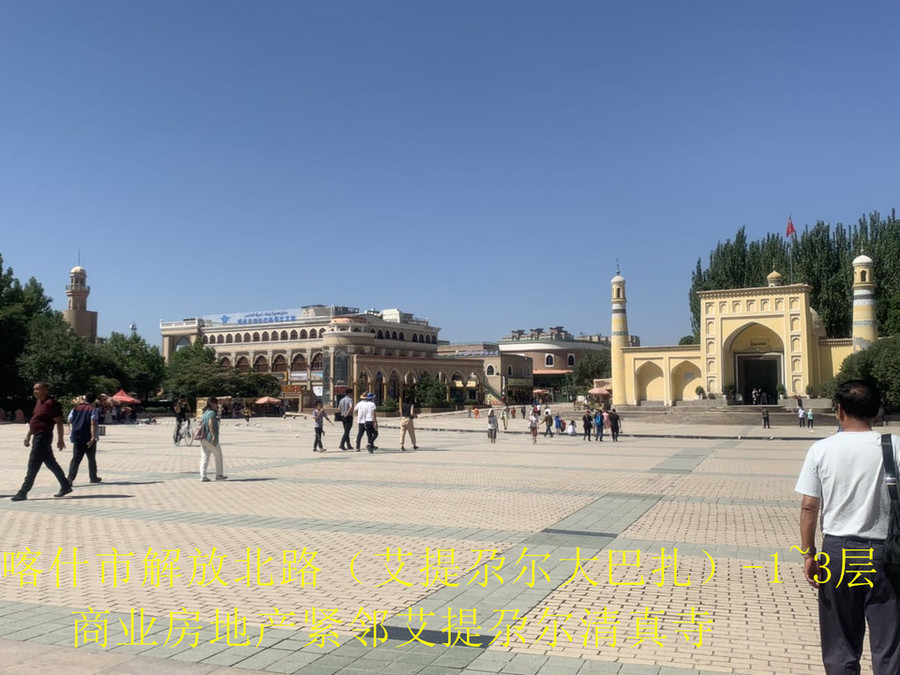
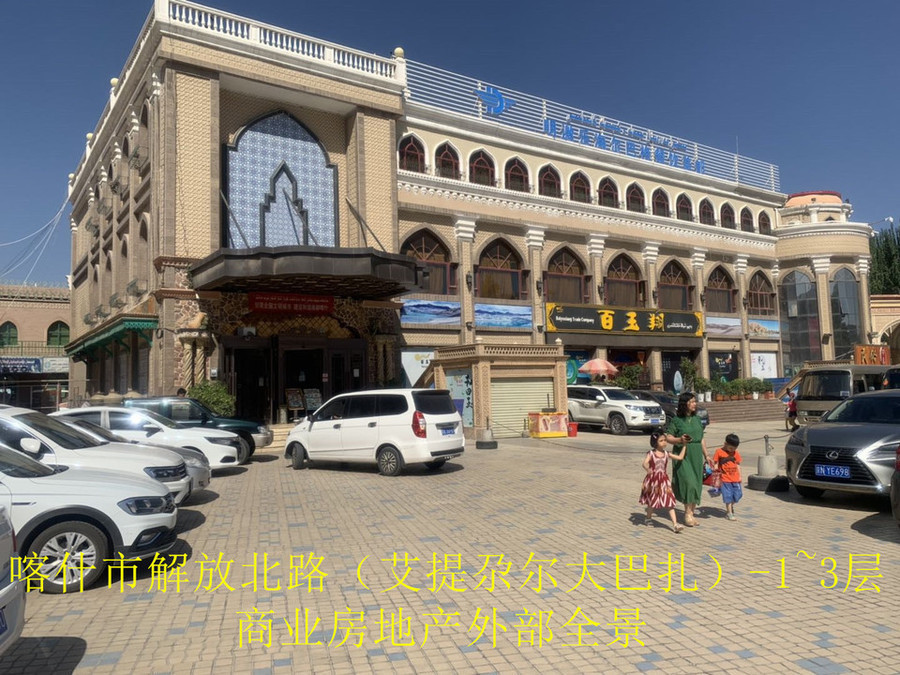
An August 2021 search of China Judgments Online for Abdujelil Helil returned only two documents, both related to the building in Kashgar. The Kashgar Agricultural Bank filed a lending contract dispute with Abdujelil together with two other individuals over a loan of 40 million yuan (over US$6 million). The court seized the building, appraised at 76,636,300 yuan (US$11,820,934), in August 2018.22 “喰疆喀什农村商业银行股份有限公司与新疆海利力国际贸易有限公司、喀什天德立实业有限责任公司等借款纠纷执行实施类执行裁定书(2020)新31执恢9号之三” [Canjiang Kashgar Rural Commercial Bank Joint Stock Co., Ltd., Xinjiang Helil International Trading Co., Ltd., Kashgar Tiandeli Industrial Co., Ltd., etc. loan dispute implementation ruling (2020) Xinjiang 31 Resumed Enforcement Case No. 9 of 3], Xinjiang Uyghur Autonomous Region Kashgar Prefecture Intermediate People’s Court], December 29, 2020, https://wenshu.court.gov.cn/website/wenshu/181107ANFZ0BXSK4/index.html?docId=fd8889e2c3ff47159e84aca0009ac00d, archived here. Several Kazakh former detainees have reported aggressive demands for loan repayments from banks following their release from the camps. See Safiya Sadyr, “The Xinjiang Camp Debt Trap,” Foreign Policy, August 8, 2020, https://thediplomat.com/2020/08/the-xinjiang-camp-debt-trap/ His wife’s objections to the seizure were dismissed by the Kashgar Intermediate People’s Court in January 2021.23 “喰疆喀什农村商业银行股份有限公司与新疆海利力国际贸易有限公司、喀什天德立实业有限责任公司等合同、无因管理、不当得利执行审查类执行裁定书(2021)新31执异14号,” [Canjiang Kashgar Rural Commercial Bank Joint Stock Co., Ltd., Xinjiang Helil International Trade Co., Ltd., Kashgar Tiandeli Industrial Co., Ltd. and other contracts, no cause management, improper profit review implementation ruling (2021) Xinjiang 31 Enforcement Objection Case No. 14], Xinjiang Uyghur Autonomous Region Kashgar Prefecture Intermediate People’s Court, January 28, 2021, https://wenshu.court.gov.cn/website/wenshu/181107ANFZ0BXSK4/index.html?docId=0f5b485a21c24845ad1eacbd01156e3f, archived here. It is possible that these court documents, and not others, appear in China Judgments Online since they involve the less sensitive issue of a loan default—which is likely to have been caused by Abdujelil’s imprisonment, the records of which remain secret. Abdujelil’s company likely would not have defaulted on this loan had it not been fined or his accounts frozen. Significantly, the completion of this auction means that a property in the historic center of the famed Uyghur city of Kashgar has been transferred from Uyghur to Han hands through the actions of the Chinese state.
Abdujelil was tried a second time in 2019 after his lawyers submitted an appeal arguing that his first trial had “violated court proceedings” because he had not had access to lawyers. On January 8, 2019, the XUAR High People’s Court returned the case to the Kashgar People’s Court for retrial.24 “Uyghur Businessperson Remains Jailed Eight Months After ‘Terrorism’ Conviction Reversed on Appeal,” Radio Free Asia, September 17, 2019, https://www.rfa.org/english/news/uyghur/appeal-09172019145104.html A family friend living overseas received information that Abdujelil’s health had deteriorated in prison, and at some point, he was transferred to a hospital in Kashgar. The same friend received documents revealing that the court accused him of more serious charges during the second trial, alleging he was a member of the East Turkistan Islamic Movement (ETIM).25The supposed threat of the East Turkistan Islamic Movement (ETIM) is used by the Chinse government as a major justification of its repressive policies with the Uyghur Region and transnationally. This name came to be attributed to a small group of Uyghurs in Afghanistan in the 1990s which functionally ceased to exist in the 2000s. The U.S. State Department added the group to the list of Foreign Terrorist Organizations and Terrorist Exclusion List in 2002 in a move widely seen as an attempt to gain Chinese support in the War on Terror, but delisted it in 2020. The Chinese government has never produced information proving that this group existed in or committed violence within China’s borders. See Sean Roberts, “Why Did the United States Take China’s Word on Supposed Uighur Terrorists?,” Foreign Policy, November 10, 2020, https://foreignpolicy.com/2020/11/10/why-did-the-united-states-take-chinas-word-on-supposed-uighur-terrorists/ The trial was held in secret at the Qalghach Binam Prison on March 17, 2021. His lawyers, from a Sichuan based firm, were notified one week in advance of the trial. The Ministry of Justice pressured them to drop the case, saying that the verdict was predetermined and they would be unable to prove Abdujelil innocent.26 “Uyghur Who Appealed Jail Sentence Charged With Additional Crimes,” Radio Free Asia, March 31, 2021, https://www.rfa.org/english/news/uyghur/appeal-03312021195653.html
Mamatali Kashgarli was arrested and tried along with Abdujelil Helil in connection to the “aiding terrorism” accusation. The court sentenced him to 15 years’ imprisonment and confiscated 74 million yuan (more than US$10 million) of his property.27A typographical error was corrected from “US$1 million” to “US$10 million” on December 22, 2021 Mamatali and his brother Ahmad (also Ahmet) Kashgarli are naturalized Turkish citizens who both conducted trading businesses in China, with Mamatali’s based around a clothing shop in Ürümchi importing merchandise from Turkey.28 “Xitayning sot hökümitide [sic] ‘Térrorchi’ dep tilgha élin’ghan exmet qeshqerli akisi memet’eli we sodiger abdujélil abduxélil bilen bolghan alaqisi heqqide toxtaldi” [Ahmat Kashgarli, referred to as a “terrorist” in a Chinese court ruling, speaks about his relationship to his brother Mamtili Kashgarli and businessman Abdujelil Helil], Radio Free Asia, March 29, 2021, https://www.rfa.org/uyghur/xewerler/uyghur-weziyiti-03292021193308.html In an interview with UHRP, Ahmad Kashgarli said that Mamatali was taken away in April 2017, shortly after Abdujelil Helil. Ahmad told us that he submitted his brother’s information to the Turkish foreign ministry, who told him that they had been informed that his brother had been detained for “helping terrorist organizations.”29 Ahmad Kashgarli, interview with UHRP, April 2021.
Mamatali Kashgarli did not have any formal business relationship with Abdujelil Helil. The charges against him appear to be connected to the fact that Abdujelil’s wife had transferred a large amount of money to Mamatali to pay for goods from Turkey. Ahmad Kashgarli believes that his brother and Abdujelil Helil’s alleged connection to terrorists is based on these connections to Turkey, including to himself. He says he has never met Abdujelil Helil, whom he says was reportedly very cautious about who he met with while visiting Turkey. Mamatali’s conviction was likewise upheld in the retrial.30 “Xinjiang Authorities Uphold Jail Term For Uyghur Turkish National in Secret Prison Retrial,” Radio Free Asia, April 15, 2021, https://www.rfa.org/english/news/uyghur/retrial-04152021160420.html
The case of Abdujelil Helil and Mamatali Kashgarli is a telling example of the government’s rapidly shifting treatment of Uyghur business leaders. As late as February 2017, Abdujelil was quoted in state media praising a VAT tax reform which lowered the burden on businesses.31 China National Radio, “营改增成为维护新疆稳定压舱石” [VAT reform has become a ballast stone to maintain stability in Xinjiang], Sina Finance and Economics, February 2, 2017, http://finance.sina.com.cn/roll/2017-02-17/doc-ifyarrcf4512347.shtml His Kashgar Trade Association had once been praised in state media for its “great contributions” to the city’s economic and social development and efforts to “give back to society.”32 China Radio International, “记者手记:访喀什噶尔商会 小商会转动大社会” [Reporter’s Notes: Interview with Kashgar Chamber of Commerce, A Small Chamber of Commerce Turns into a Large Society], June 17, 2015, http://politics.people.com.cn/n/2015/0617/c70731-27169631.html The government initially supported the overseas business connections of the association’s members. The government also praised Abdujelil’s company, Xinjiang Helil International Trade Ltd., for jointly operating a charter flight to the UAE in partnership with Emirates Airlines in 2015, which it applauded for “promoting commerce, logistics, tourism, and cultural exchanges in Kashgar and southern Xinjiang.”33 China News Service, “新疆喀什开通直飞阿联酋沙迦商务旅游包机” [Xinjiang Kashgar opens direct business travel charter flights to Sharjah, UAE], February 12, 2015, http://www.chinanews.com/gj/2015/12-07/7660156.shtml The Kashgar Trade Association was lauded for supporting the Belt and Road Initiative by setting up a business forum connected to the China-Pakistan Economic Corridor in 2016, connecting member enterprises to businesses in Pakistan.34 “喀什噶尔商会组团赴巴基斯坦参加’巴—中经济走廊商贸论坛’” [The Kashgar Chamber of Commerce organizes a delegation to Pakistan to participate in the ‘Pakistan-China Economic Corridor Business Forum], Xinjiang Autonomous Region Federation of Industry and Commerce, September 19, 2021, https://www.acfic.org.cn/gdgsl_362/xinjiang/xjfgdt/201504/t20150411_37553.html Ironically, simply visiting the UAE or Pakistan would become a sign of “extremism” for Uyghurs less than a year later.35 Human Rights Watch, “‘Eradicating Ideological Viruses’: China’s Campaign of Repression Against Xinjiang’s Muslims,” September 9, 2018, https://www.hrw.org/report/2018/09/09/eradicating-ideological-viruses/chinas-campaign-repression-against-xinjiangs#
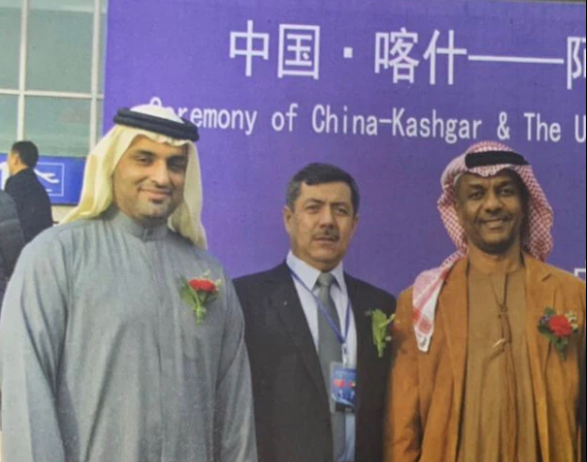
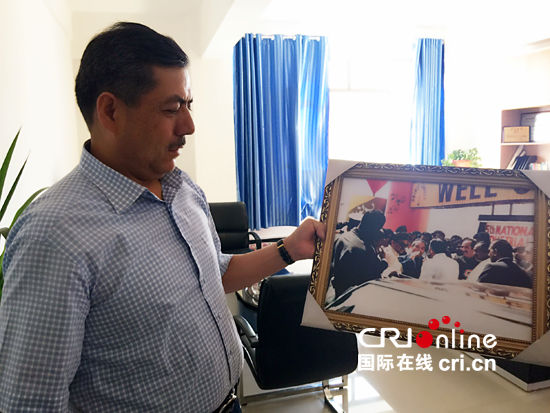
Case 2: Ablimit Ababakri and Abduehet Ababakri
The case of brothers Ablimit Ababakri and Abduehet Ababakri, real estate developers from Hotan, provides a rare example of the Chinese government admitting to the imprisonment of Uyghurs on terrorism charges. The brothers appeared in an April 2021 CGTN documentary entitled “The War in the Shadows: Challenges of Fighting Terrorism in Xinjiang,” in which the Chinese government propaganda apparatus lays out a narrative of Uyghur businesspeople as secret traitors and terrorists.36 CGTN, “The war in the shadows: Challenges of fighting terrorism in Xinjiang,” April 1, 2021, https://news.cgtn.com/news/2021-04-02/The-war-in-the-shadows-Challenges-of-fighting-terrorism-in-Xinjiang-Z7AhMWRPy0/index.html
UHRP discovered that millions of dollars’ worth of property under the names of the brothers and their company, the Hotan Makan Real Estate Development Company (墨玉县玛卡尼房地产开发有限公司), were auctioned on Taobao in February 2021. The auctioned assets include the following:
- 38 unfinished apartments in the brothers’ Makan commercial and residential building in Hotan worth 15.5 million yuan (US$2.4 million), which were seized and appeared at auction throughout 2021;
Each of these auctions includes the same court ruling number: (2020)新3222执545号执行裁定书. However, we have been unable to find official court documentation of the brothers’ arrest, trials, and sentencing. Nor were we able to locate relevant court documents related to the brothers in China Judgments Online.
The case of brothers Ablimit Ababakri and Abduehet Ababakri, real estate developers from Hotan, provides a rare example of the Chinese government admitting to the imprisonment of Uyghurs on terrorism charges.
The 2021 CGTN documentary in which Ablimit and Abduehet both appeared is notable for its depiction of a large cross-section of Uyghur society, including Ministry of Education officials who have been sentenced to life in prison, as “terrorists.”37 The textbook editors’ supposed “crimes” include editing textbooks that portrayed local Uyghur resistance to Qing-empire (1644–1912) invaders. The textbooks, all of which passed through the censors and were officially approved for publication and use in educational settings in the Uyghur Region, had been in use since 2003; in the current campaign, however, they are now interpreted as “stirring ethnic hatred.” The documentary claims a link between Ablimit and Abduehet and a Uyghur former government official named Shirzat Bawudun (希尔扎提·巴吾东), claiming that Shirzat “colluded with foreign terrorist organizations in an attempt to sabotage our counter-terrorist and counter-extremism work from within.”38 “新疆政法委原副书记勾结境外恐怖分子,妄想’建国’当’领导人’” [The former deputy secretary of the Xinjiang Political and Legal Committee colluded with overseas terrorists in the delusion of “founding the country” and becoming a “leader”], Guancha, April 2, 2021, https://www.guancha.cn/politics/2021_04_02_586152.shtml. Shirzat Bawudun was a high-ranking public security official who formerly held a number of important posts, including Director General of the Xinjiang Ministry of Justice and Deputy Secretary of the Xinjiang Political and Legal Committee, among others. The CGTN documentary accuses him of being “a typical example of a ‘two-faced person.’” In what appears to be a forced confession, Shirzat says that he wanted to become the leader of an independent East Turkistan.39 This is similar to an accusation made against former head of the Xinjiang Food and Drug Administration and former Xinjiang Medical University president Halmurat Ghopur, who was given a suspended death sentence in 2017 for supposedly plotting to create an independent country and become its leader. See “Prominent Uyghur Intellectual Given Two-Year Suspended Death Sentence For ‘Separatism,’” Radio Free Asia, September 28, 2018, https://www.rfa.org/english/news/uyghur/sentence-09282018145150.html The documentary states that Shirzat Bawudun supported Ablimit and Abduehet’s business in order to establish an economic basis for his planned “sabotage,” ordering the brothers to transfer 10 million yuan (US$1.5 million) to ETIM in Egypt and send 60 Uyghur teenagers to join ISIS.40 Xia Kedao, “谁是祸害新疆的‘内鬼’?” [Who are the ‘inner demons’ that harm Xinjiang?], Sina News, April 2, 2021, https://news.sina.com.cn/c/2021-04-02/doc-ikmyaawa4407093.shtml. The Chinese government has frequently accused Uyghurs of being involved with “ETIM” without presenting evidence. Despite a lack of credible evidence that terrorist networks exist in the Uyghur Region, the government has used these supposed “networks” as the primary justification for its violent crackdown and policies of forced assimilation. The footage of the individuals who appear in the documentary bears the hallmarks of the forced confessions which the Chinese government frequently utilizes in its propaganda. For more on ETIM, see Sean Roberts, The War on the Uyghurs: China’s Campaign Against Xinjiang’s Muslims (Princeton, NJ: Princeton University Press, 2020). For more on forced confessions and hostage-style videos, see Uyghur Human Rights Project, “‘The Government Never Oppresses Us: China’s proof-of-life videos as intimidation and a violation of Uyghur family unity,” February 2, 2021, https://uhrp.org/report/the-government-never-oppresses-us-chinas-proof-of-life-videos-as-intimidation-and-a-violation-of-uyghur-family-unity/
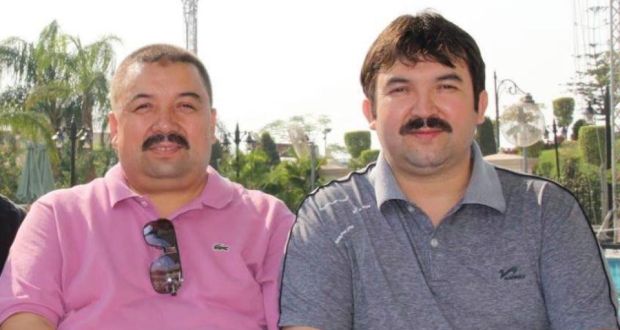
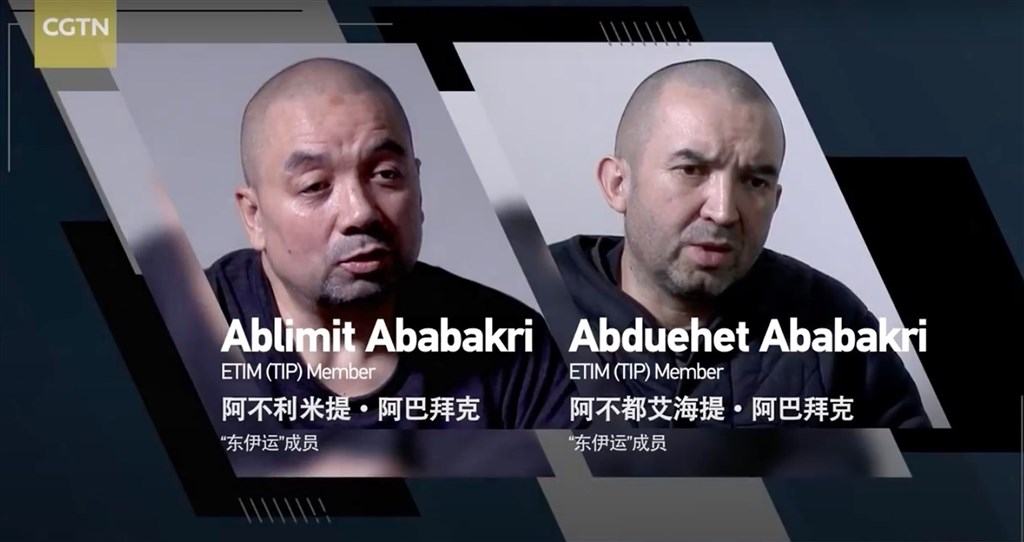
In an interview with UHRP, Ablimit’s son Abdusalam said he found his father and uncle’s appearance in the documentary shocking, saying that he was initially unable to recognize his father when he first saw a still image from the footage due to his shaved head and shockingly thin weight. Abdusalam was also in disbelief that an official media source had portrayed the two men as terrorists. He reports hearing that the Discipline Inspection Commission in Ürümchi detained his uncle first, in February 2017. When police reportedly came to look for Abduehet in April 2017, apparently unaware that the Discipline Inspection Commission had detained him, they took Ablimit into custody. In 2020 Abdusalam heard that his father and uncle might receive heavy sentences, but he never expected they would be based on charges of terrorism.41 Abdusalam Ablimit, interview with UHRP, May 2021.
Abdusalam dismisses the accusations in the documentary, saying that Shirzat Bawudun and his father knew each other socially in Ürümchi since both were from Hotan. Ablimit and Abduehet had long been established in business, having entered the private sugar wholesale business after the state-owned enterprise they worked for was dissolved in 2000. They built on their early success to establish intercity bus lines, a taxi company, a restaurant, and eventually commercial and residential real estate in Hotan.
Like many other wealthy families, this one has international ties. Abdusalam was able to attend a language program at Tanta University in Egypt in 2011. His uncle Abduehet enrolled his children in an international school in Cairo in 2012, and until 2015 would travel between Hotan and that city. Abdusalam told us that his uncle had moved his children to Egypt for their education and was cautious about what he did and who he met there, living in the wealthy district of New Cairo far from where other Uyghurs in the city lived. He went on to say that Shirzat Bawudun never met his father and uncle in Cairo as the documentary claimed. He also said that Tahir Abbas has never met Shirzat Bawudun, despite the claim in the documentary that the two men are connected.42“Turkey-Based Uyghur Denies Contact With Condemned Official, ‘Terrorist’ Group,” Radio Free Asia, April 16, 2021, https://www.rfa.org/english/news/uyghur/denies-04162021170223.html
Case 3: Ruzi Haji Hemdul and Mehmet Hemdul
Another prominent case of Uyghur businesspeople who were detained in the initial phase of the crackdown and were later sentenced to prison in apparently secret trials is that of brothers Ruzi Haji Hemdul and Mehmet Hemdul. The brothers were co-owners of Xinjiang Ruzi Haji Ltd., a shipment company, and the Korla Chilanbagh Real Estate Development Company, and were among the most successful Uyghur businesspeople in Korla. Their prominence in the community was bolstered by their donations to causes such as the construction of mosques, as well as supporting students and children in need. In addition, at the time of their disappearance into state custody, they were constructing a hospital in Ankara, Turkey according to their brother Omerjan Hemdul.
Omerjan, who currently resides in Turkey, has spoken out on his family’s behalf. In an April 2021 interview with UHRP, Omerjan described information he received in 2017 suggesting that his brothers’ bank accounts had been frozen and their properties in Ürümchi, Korla, and Hotan seized. He estimates the total worth of their assets prior to state seizure at approximately 1 billion yuan (US$140 million).43 Omerjan Hemdul, interview with UHRP, April 21, 2021.
Two properties appearing under Ruzi Hemdul’s name are listed in Taobao auctions. They include the following:
- An apartment in the Tianwan neighborhood of the Tianshan District in Ürümchi, which was auctioned in September 2019 for 1,366,620 yuan (US$211,492);
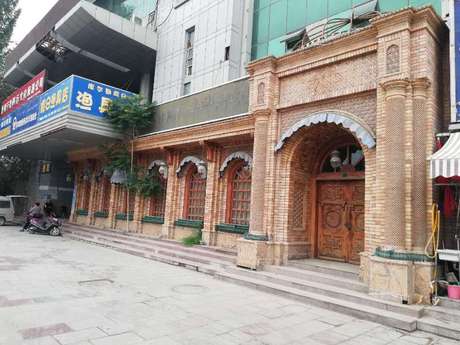

Omerjan described to us how he had accompanied his father on Haji in 2012 and remained in Saudi Arabia to study. He was able to regularly return to Korla to visit his family until September 2016. That month his wife, who had remained in East Turkistan, informed him that the authorities had come to confiscate her and their daughters’ passports. She told the authorities that she would turn them in two days later, but instead left with their two daughters who also had passports. She was forced to leave their two other daughters, who did not yet have passports, behind in their care of their grandmother, and the family remains separated to this day.
Omerjan was able to obtain information about his brothers from sources in East Turkistan, including a Han former employee of his brother’s company. In October 2017, Ruzi was taken away by the authorities, and Mehmet told Omerjan that he would be left in charge of the property in Ankara. Mehmet was then detained in November of the same year. Omerjan told us he heard that his two sisters had been sent to the camps and later released, and he still does not know the whereabouts of his mother.
Later, Omerjan received information that Ruzi Hemdul had been sentenced to 25 years in prison and Mehmet Hemdul to 15 years. He believes their imprisonment might be related to their charitable work in supporting Uyghur students and donating money to the construction of mosques, but that the authorities have ultimately targeted his brothers for their success and wealth, particularly given that the two were always cautious about appearing to take any political stances. The documents attached to the Taobao auctions of their property do not reveal information on the reasons for their imprisonment. However, many of their personal and business dealings, including travel to Saudi Arabia, going on the Hajj, engaging in Islamic philanthropy, and sending money abroad, are all known pretexts for the extralegal detention and arrest of Uyghurs, and thus could all be factors in accusations of supporting terrorism.44 Uyghur Human Rights Project, “‘Ideological Transformation’: Records of Mass Detention from Qaraqash, Hotan,” February 18, 2020, https://uhrp.org/report/ideological-transformation-records-mass-detention-qaraqash-hotan-html/
He believes their imprisonment might be related to their charitable work in supporting Uyghur students and donating money to the construction of mosques, but that the authorities have ultimately targeted his brothers for their success and wealth, particularly given that the two were always cautious about appearing to take any political stances.
Three court rulings involving Ruzi Hemdul appear in China Judgments Online. One is a 2019 contract dispute between the Xinhua Bookstore in Bayingholin Prefecture and the Bazhou Chilanbagh Real Estate Development Company involving demolition and relocation.45 “新疆巴音郭楞蒙古自治州新华书店与巴州其兰巴格房地产开发有限责任公司房屋拆迁安置补偿合同纠纷执行实施类民事裁定书(2019)新2801执保312号” [Demolition and Resettlement Compensation Contract Dispute Between the Xinjiang Bayingolin Mongol Autonomous Prefecture Xinhua Bookstore and the Bazhou Chilanbagh Real Estate Development Co. Ltd., Implementation of Civil Ruling (2019) Xinjiang 2801 Property Preservation Enforcement Case 312], Xinjiang Uyghur Autonomous Region Korla City People’s Court, December 26, 2019, https://wenshu.court.gov.cn/website/wenshu/181107ANFZ0BXSK4/index.html?docId=2f4863df46054c39ab13ab2e00d2edb1, archived here. The state-owned bookstore requested a freeze of nearly 7 million yuan of the company’s assets, which the court granted. An 81% share of the Bazhou Chilanbagh Real Estate Development was put up for auction in November 2019 but later withdrawn.46 “巴州其兰巴格房地产开发有限责任公司法定代表人名下(81%)股权进行拍卖,” [81% of the Share Equity Under the Name of Bazhou Chilanbagh Real Estate Development Co., Ltd.’s Legal Representative is Being Auctioned], Alibaba Judicial Auctions, December 15, 2019, https://sf-item.taobao.com/sf_item/607332212487.htm?spm=a213w.7398554.paiList.16.75581d88Pbb8DK, archived here. Documentation we found on China Judgments Online shows that an individual named Alim Mahmuti had disputed ownership of the shares. He requested 2,494,800 yuan (US$386,084) be frozen, followed by a request to unfreeze 40.5% of the Bazhou Chilanbagh Real Estate Development Company, both of which the courts granted.47 “阿里木·马合木提与肉孜·艾木都股东资格确认纠纷执行实施类民事裁定书 (2019)新2801执保234号” [Alim Mahmuti and Ruzi Hemdul Shareholder Qualification Confirmation Dispute Enforcement Civil Ruling (2019) Xinjiang 2801 Property Preservation Enforcement Case No.234], Xinjiang Uyghur Autonomous Region Korla City People’s Court, November 29, 2019, https://wenshu.court.gov.cn/website/wenshu/181107ANFZ0BXSK4/index.html?docId=175a3eea571b47bc9ff3ab1300ca8873, archived here; “阿里木·马合木提与肉孜·艾木都、巴州其兰巴格房地产开发有限责任公司执行异议之诉执行实施类执行裁定书(2020)新28执230号” [Alim Mahmuti and Ruzi Hemdul, Bazhou Chilanbagh Real Estate Development Co., Ltd. Execution of the Enforcement Objection Ruling, (2020) Xinjiang 28 Initial Enforcement Case No. 230], Xinjiang Uyghur Autonomous Region Bayingolin Mongol Autonomous Prefecture Intermediate People’s Court, November 28, 2020, archived here. The remaining 40.5% share was then auctioned on Taobao for nearly 2 million yuan (over US$300,000).48 “巴州其兰巴格房地产开发有限责任公司法定代表⼈名下(40.5%)股权进⾏拍卖” [40.5% of the Share Equity Under the Name of Bazhou Chilanbagh Real Estate Development Co., Ltd.’s Legal Representative is Being Auctioned], Alibaba Judicial Auctions, January 15,2020, https://sf-item.taobao.com/sf_item/609615224652.htm?spm=a213w.7398504.paiList.1.4ff73b0cKGzadC&track_id=4cbf0bc6-0c65-4211-a028-230d1ee008eb, archived here. It is unclear what relation this auction has to the seizure of the brothers’ property on criminal charges. Based on information provided by Omerjan Hemdul, the auctions found on Taobao appear to represent only a small fraction of the brothers’ wealth.
Two court rulings in China Judgments Online, both dated April 10, 2020, and issued by the Korla Bingtuan Court, mention Mehmet Hemdul. In the rulings, an individual named Abdukerim Tursuntohti requests the court validate his ownership of 17.5% and a further 2% of the shares of the Xinjiang Shangde Real Estate Development Company. Abdukerim Tursuntohti states he paid for the shares in 2014 but Mehmet Hemdul had not changed the ownership registration “for various reasons.” The court dismissed the requests on the grounds that they had no jurisdiction despite the fact that Mehmet Hemdul was serving a sentence in Korla Prison of the Bingtuan Second Division, because the company was registered in Hotan and the plaintiff lived in Wusu.49 “蘿不都克热木·吐松托合提与买买提·艾木都股权转让纠纷一审民事裁定书 (2019)兵0201民初529号” [Abdukerim Tursuntohti and Mehmet Hemdul Equity Transfer Dispute First Civil Ruling (2019) Bingtuan 0201 First Instance Civil Case No.529], Xinjiang Production and Construction Corps Korla Reclamation District People’s Court, April 10, 2020, https://wenshu.court.gov.cn/website/wenshu/181107ANFZ0BXSK4/index.html?docId=cf1b4ac7e7c34691a574ab9900261731, archived here; “蘿卜杜哈巴尔·艾合麦提与买买提·艾木都股权转让纠纷一审民事裁定书(2019)兵0201民初530号” [Abdukerim Tursuntohti and Mehmet Hemdul Equity Transfer Dispute First Civil Ruling (2019) Bingtuan 0201 First Instance Civil Case No.530], Xinjiang Production and Construction Corps Korla Reclamation District People’s Court, April 10, 2020, https://wenshu.court.gov.cn/website/wenshu/181107ANFZ0BXSK4/index.html?docId=7ac8bf21a05a45098449ab99002616ff, archived here.
Case 4: Ekber Imin, Mehmetturdi Imin, and Mehmetjan Imin
Another case of involving the group arrest and trial of brothers is that of Ekber Imin, Mehmetjan Imin, and Mehmetturdi Imin. They respectively acted as supervisor, manager, and executive director of the Güzel Makan Real Estate Company (美居房地产开发有限公司), one of Hotan’s most successful real estate companies. Ekber had become wealthy in the jade trade before moving into real estate. In 2020, Radio Free Asia revealed that the three brothers had been arrested in 2018, along with at least 20 associates and employees.50 “Öy-mülük sodigiri ekber iminning qérindash we shérikliridin 30 nechche kishining tutqunda ikenliki delillendi” [More than 30 of real-estate developer Ekber Imin’s family and associates confirmed in custody], Radio Free Asia, January 21, 2020, https://www.rfa.org/uyghur/xewerler/ekber-imin-01202020131349.html
We found properties belonging to the brothers and their real estate company up for auction on Taobao. The legal documents attached to the auctions show that the properties below were seized during a criminal case:
- 49 apartments in Hotan, with commercial space in one building priced at over 4.5 million yuan (US$696,400);
A local government official in Hotan told RFA that Ekber had been sentenced to 25 years and his brothers had received 20 years’ imprisonment each.51Translated transcripts of interviews conducted by RFA reporters are available at shahit.biz. See “Entry 7076: Ekber Imin,” Xinjiang Victims Database, last updated February 12, 2021, https://shahit.biz/eng/viewentry.php?entryno=7076 Officials gave various reasons for the brothers’ imprisonment, including providing housing for a former camp detainee and incorporating ethnic and religious elements into building designs. 52“Uyghur Real Estate Magnate Confirmed Jailed Along With Brothers, at Least 20 Employees,” Radio Free Asia, January 17, 2020, https://www.rfa.org/english/news/uyghur/magnate-01172020175553.html. The only official Chinese reference to Ekber’s arrest is in a February 2021 Xinhua article claiming to refute an entry in the Xinjiang Victims Database, stating that he had been sentenced to 25 years in prison for “organizing and leading an organized crime gang, forced transactions, robbery and illegal detention.”53 China News Service, “新疆民众现身辟谣:“维吾尔司法档案库”是彻头彻尾的‘谎言库’” [Xinjiang people arrive to refute rumors: “Uyghur Judicial Archives” is a complete “library of lies”], February 1, 2021, https://www.chinanews.com/gn/2021/02-01/9401984.shtml; “Entry 7076: Ekber Imin,” Xinjiang Victims Database, last updated February 12, 2021, https://shahit.biz/eng/viewentry.php?entryno=7076 The article makes no mention of his brothers Mehmetjan and Mehmetturdi.
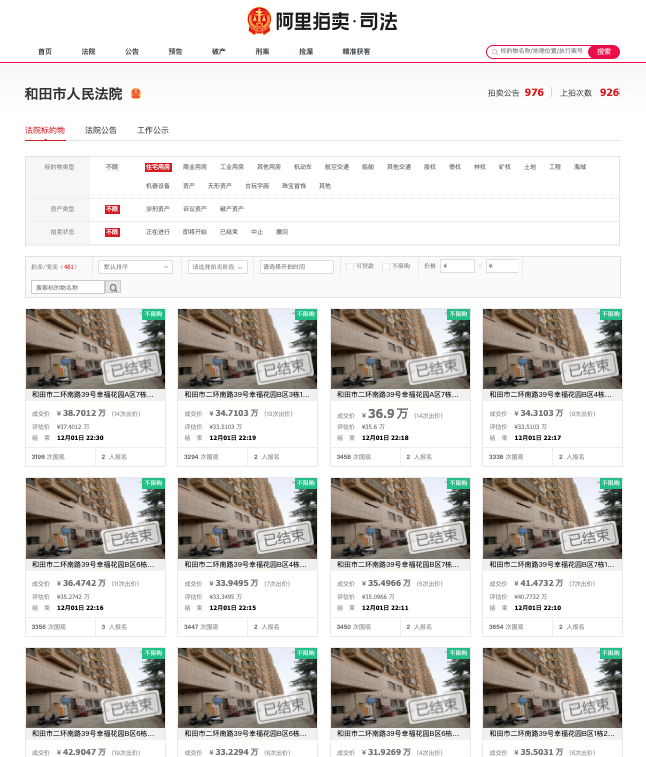
The number of businesspeople accused of involvement in organized crime has exploded since the beginning of the national “sweep away the black and eliminate evil” (扫黑除恶) campaign against organized crime launched in 2018. As in the case of the crackdown on Uyghurs, the saohei campaign appears to be a politicalized measure involving an element of prosecution quotas, and the families of those prosecuted say their relatives are innocent.54 Emily Feng, “How China’s Massive Corruption Crackdown Snares Entrepreneurs Across the Country,” National Public Radio, February 4, 2021, https://www.npr.org/2021/03/04/947943087/how-chinas-massive-corruption-crackdown-snares-entrepreneurs-across-the-country The courts and public security organs have been guided to target groups which “threaten political security, especially security of political power and systems.”55 Jeremy Daum, “Stability and Control, Inside and Out,” China Law Translate, July 21, 2021, https://www.chinalawtranslate.com/en/stability-and-control/ In the Uyghur Region, public security organs have framed the saohei campaign in terms of “[c]riminal gangs that, under ethnic or religious ‘banners’, carry out market domination” and “evil religious forces disrupting the order of public security in villages.”56 China Law Translate, “Xinjiang Wusu City Public Security Bureau Notice on Reporting and Revealing Underworld Forces,” February 14, 2018, https://www.chinalawtranslate.com/en/xinjiang-wusu-city-public-security-bureau-notice-on-reporting-and-revealing-underworld-forces/
This context suggests that the saohei campaign is also being used as a mandate to target Uyghurs and might have played a role in the case of Ekber, Mehmetjan, and Mehmetturdi Imin. The “organized crime” charges against Ekber Imin were possibly designed to fulfill the mandate of the saohei campaign and justify the seizure of assets. If this Chinese media report is accurate, Ekber has not been charged with the common “aiding terrorism” allegation. However, we know relatively little about the details of his case because the Chinese government continues to conceal judicial records related to it, along with those of many other Uyghurs.
Case 5: Eli Abdulla
Eli Abdulla is a real estate developer from Hotan who disappeared at the beginning of the crackdown and was sentenced in 2017, with sources claiming he had been sentenced to life in prison.57“Entry 6631: Eli Abdullah,” Xinjiang Victims Database, last updated April 2, 2021, https://shahit.biz/eng/viewentry.php?entryno=6631 As in the case of Ekber Imin and his brothers, numerous relatives and employees of his company were also arrested. An official from the Hotan Politics and Law Commission told an RFA reporter that he had been sentenced for a donation to a local mosque, though there were also rumors of disputes with Han Chinese companies over control of jade mining in the region.58 “Uyghur Developer Confirmed Jailed For Life, Dozens of Relatives and Employees Sentenced,” Radio Free Asia, December 20, 2019,https://www.rfa.org/english/news/uyghur/developer-12202019165452.html
Although the details of why he was imprisoned are not public, the authorities seized his property, as in the above cases. UHRP found several being auctioned on Taobao, including:
- An office building under the name of Eli Abdulla and his company Xinjiang Yucheng Real Estate Development, put up for auction in October 2019 for 70,942,000 yuan (over US$11 million) was purchased by the Hotan Jiahe Natural Gas Company.
Previously Unreported Cases
UHRP found additional auctions revealing evidence of Uyghur businesspeople targeted in the crackdown. Unlike the above cases, the following cases involve individuals whose detentions have not been reported elsewhere. The following seven cases all include court documents explicitly referring to individuals having been sentenced for crimes such as “aiding terrorist activities” and “extremism,” in contrast to cases 1–5, in which information about charges has come from family members residing abroad and even Chinese state media. The politicized nature of the charges against these businesspeople has led UHRP to conclude that they were targeted as part of the crackdown that began in 2016–17.
A court order attached to the Taobao auctions of a number of properties lists 28 individuals jointly sentenced for “helping terrorist activities.” The document does not reveal enough details to explain why they are being charged together or what their supposed crimes are.
Case 6: Isa Jelil and 27 Others
A court order attached to the Taobao auctions of a number of properties lists 28 individuals jointly sentenced for “helping terrorist activities.” It is not immediately clear the relationship these individuals have to one another; some share patronyms, suggesting they might be siblings.59 As we noted in an earlier footnote, most Uyghurs use patronymic surnames. In this context, individuals with the same surname are likely to be siblings, but these names may be transliterated differently when written in Chinese characters, given the possibility for errors in transliteration. The document states that Isa Jelil and 27 other individuals were criminally sentenced for helping terrorist activities, and that the court seized their property and froze their accounts.60 “新疆维吾尔自治区洛浦县人民法院执行裁定书(2018)新3224执248号” [Enforcement Ruling (2018) Xinjiang 3224 Initial Enforcement Case No. 248], Xinjiang Uyghur Autonomous Region Lop County People’s Court, June 29, 2018, archived here. Of these 28 individuals, only one, Tursunnisa Tursunniyaz, is a woman. The document does not reveal enough details to explain why they are being charged together or what their supposed crimes are. What is clear from the amount of property being auctioned is that at least some of them owned considerable wealth.
The document, issued by the Lop County People’s Court in 2018, lists the following individuals:
| Name | Name in Chinese transliteration | Birthdate |
| Isa Jelil | 艾沙·吉力力 | 1/1/1975 |
| Ehmettohti Imin | 艾合麦提托合提·伊敏 | 11/3/1977 |
| Abdureshit Eziz | 阿卜杜热西提·艾则孜 | 2/17/1988 |
| Abdulla Memetimin | 阿卜杜拉·麦麦提敏 | 3/18/1960 |
| Obulhesen Rozi | 吾布力艾山·肉孜 | 9/7/1981 |
| Urayim Begtomur | 吾热依木·拜格铁木尔 | 3/21/1971 |
| Memetimin Abdurahman | 麦麦提敏·啊卜杜热合曼 | 12/4/1972 |
| Mettursun Abdulla | 麦提图尔荪·啊卜杜拉 | 5/17/1970 |
| Rozimemet Jappar | 如则麦麦提·加帕尔 | 2/15/1956 |
| Tursunnisa Tursunniyaz | 吐送尼沙·吐送尼亚孜 | 4/12/1975 |
| Hebibullah Abdurahman | 艾比布拉·阿卜杜热合曼 | 4/16/1989 |
| Seydiemer Seyit | 賽迪艾麦尔·色依提 | 1/30/1970 |
| Turghun Abdulla | 图尔贡·阿卜杜拉 | 10/30/1968 |
| Metyasin Rozi | 买提亚思尼·肉孜 | 1/1/1949 |
| Aqil Nurmemet | 阿克力·奴尔买买提 | 5/9/1970 |
| Memetimin Obul | 买买提明·吾布力 | 5/20/1962 |
| Aqil Metniyaz | 阿克力·麦提尼亚孜 | 9/12/1971 |
| Yasinjan Mahmut | 亚生江·马合木提 | 3/14/1972 |
| Ablet Mahmut | 阿卜来提·马合木提 | 7/22/1978 |
| Yaqubjan Mahmut | 牙库甫江·马合木提 | 7/14/1967 |
| Abdujelil Abduqeyyum | 阿布都吉力力·阿布都克由木 | 3/19/1974 |
| Tursunniyaz Rozi | 图尔荪尼亚孜·如则 | 1/20/1965 |
| Abduqeyyum Qurban | 阿布都克尤木·库尔班 | 11/15/1961 |
| Imir Abduqadir | 伊米尔·阿卜杜喀迪尔 | 12/4/1971 |
| Alim Abduweli | 阿力木·阿卜杜外力 | 9/11/1961 |
| Ablimit Ibrahim | 阿卜力米提·伊卜拉伊木 | 10/17/1963 |
| Mettohti Jelil | 麦提托合提·杰力力 | 10/29/1970 |
| Abduqadir Abduweli | 阿卜杜喀迪尔·阿卜杜外力 | 9/3/1970 |
Blocks of stores in a shopping center in Hotan called the International Trade City(和田市北京西路100号国际商贸城) were auctioned as part of Isa Jelil’s case, despite belonging to his family members. These auctions include the following:
- Blocks of storefronts in the International Trade City in Hotan that were auctioned in 2019 under the names of Mehmetali Isa (买买提艾力·艾萨) and Abdusemet Isa (阿卜杜赛麦提·艾萨).
Mehmetali Isa and Abdusemet Isa are possibly Isa Jelil’s sons. If so, this case might provide evidence that the XUAR government is seizing and auctioning the property of arrested Uyghurs’ family members, even if those family members do not appear to be under legal action themselves. The only document referring to Isa Jelil in China Judgments Online is a sales contract dispute over a residence in Ürümchi, which states that he was being held in the Lop County Detention Center.61 “蘿卜杜热西提·阿卜杜力木与艾沙·吉力力合同、无因管理、不当得利执行实施类执行裁定书 (2019)新3224执703号” [Implementation of the contract between Abdureshit Abdulimand Isa Jelil management of affairs, unjust enrichment ruling(2019) Xinjiang 3224 Initial Enforcement Case No. 703], Lop County People’s Court, December 11, 2019, https://wenshu.court.gov.cn/website/wenshu/181107ANFZ0BXSK4/index.html?docId=cda79c75ae3e41979aa7ab1f00d29604, archived here.
Property belonging to other individuals on the list of 28 has been auctioned on Taobao. These properties include the following:
- A block of storefronts in the Junhao Yiwu Small Goods Market in the town of Wujiaqu under the name of Obulhesen Rozi (auction postponed);
Case 7: Abdunabi Bekri and 15 others
We found a number of auctions linked to a court document listing 16 people jointly sentenced for “helping terrorist activities.”62 “执行裁定书 (2018)新3224执277号” [Enforcement Ruling (2018) Xinjiang 3224 Initial Enforcement Case No. 277], Xinjiang Uyghur Autonomous Region Lop County People’s Court, July 21, 2018, archived here. Among the individuals on this list, which consists of four women and twelve men, are two women aged 75 and 76 years, and a man aged 80. The full list includes the following people:
| Name | Name in Chinese Transliteration | Birthdate |
| Sadiq Sali | 萨迪克·萨力 | 1/11/1968 |
| Patigul Abduwali | 帕提古丽·阿布都瓦日期 | 2/18/1971 |
| Sayipjamalhan Sali | 沙衣甫加马力汗·沙力 | 11/23/1963 |
| Memetjan Salihapiz | 麦麦江·沙力阿皮孜 | 1/10/1975 |
| Eset Abduwali | 艾赛提·阿卜杜瓦日期 | 3/2/1963 |
| Emduniyaz Mehmetimin | 艾麦尼亚孜·麦麦提明 | 5/2/1965 |
| Mehmetjume Mehmetimin | 买买提居麦·麦麦提敏 | 3/7/1976 |
| Mehmetjan Metturup | 麦麦提江·麦提图如普 | 2/2/1967 |
| Yasen Metturup | 亚森·麦提图如普 | 1/2/1971 |
| Mehmetimin Metturup | 麦麦提敏·麦提图如普 | 3/6/1979 |
| Abdunabi Bekri | 阿卜杜乃比·拜科日 | 5/19/1971 |
| Abduhelil Qember | 阿卜杜合力力·凯木拜尔 | 8/9/1957 |
| Sali Hapiz | 沙力·阿皮孜 | 9/20/1940 |
| Gulayim Saidi | 古拉衣木·赛迪 | 6/8/1946 |
| Salamet Tomur | 萨拉买提·图米尓 | 9/20/1944 |
| Gholam Azizulla | 吾拉木·艾则孜组拉 | 3/8/1972 |
This court document appears as an attachment on several auctions, including the following:
- A large unfinished building in Hotan belonging to Abdunabi Bekri, for 40,880,199.68 yuan (over US$6 million) in 2019.
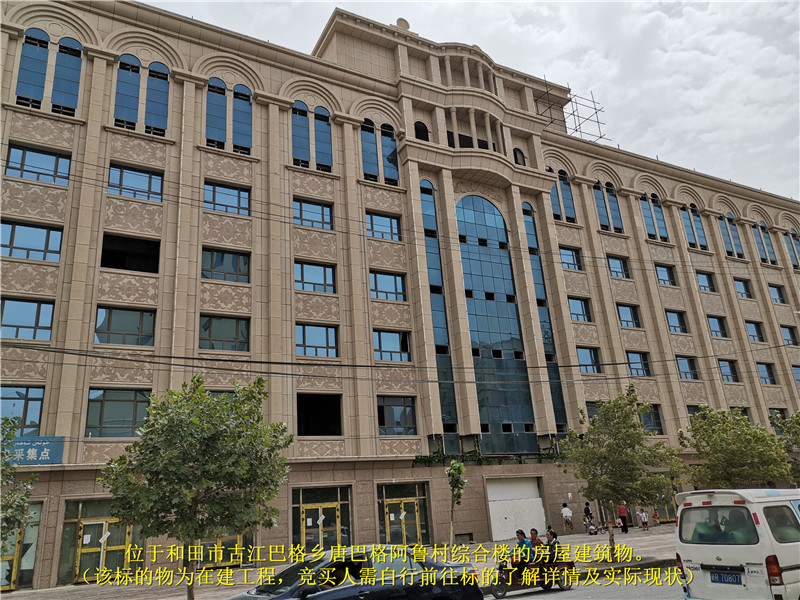
Case 8: Qeyyum Abdukerim and 6 others
Another example of joint sentencings for “helping terrorist activities” by the Lop County People’s Court in 2018 lists seven individuals, six men and one women:63“执行裁定书 (2018)新3224执278号” [Enforcement Ruling (2018) Xinjiang 3224 Initial Enforcement Case No. 278], Xinjiang Uyghur Autonomous Region Lop County People’s Court, July 12, 2018, archived here;“洛浦县和⽥路南侧英巴扎街1号斯迪克商住楼⾼层⻔⾯房1层商铺的4号商铺” [Storefront No. 4, room on the first floor of the Sediq Commercial and Residential High-rise Building, 1 Yingbazha Street, Hotan Road South, Lop County], Alibaba Judicial Auctions, February 15, 2019, https://sf-item.taobao.com/sf_item/586018029142.htm?spm=a213w.7398554.paiList.8.4dd85a92A3bbjv, archived here.
| Name | Name in Chinese Transliteration | Birthdate |
| Qeyyum Abdukerim | 克尤木·阿布都克力木 | 6/3/1976 |
| Abdul Abdukerim | 阿布都力·阿布都可克热木 | 11/10/1981 |
| Patigul Ghopur | 帕提古丽·吾普尔 | 4/10/1981 |
| Dolet Tashtomur | 多来提·塔什铁木尔 | 7/18/1968 |
| Aziz Abdukerim | 艾则孜·阿卜杜克热木 | 10/7/1975 |
Rozem Abdukerim | 热蒜木·阿布都克热木 | 10/1/1968 |
| Aziz Abdulla | 艾则孜·阿卜杜拉 | 5/25/1970 |
Commercial property belonging to Qeyyum Abdukerim was seized by Lop County People’s Court and auctioned on Taobao, including the following:
- Two storefronts auctioned in February 2019 for over 950,000 (US$147,017) yuan each;
Case 9: Jibrillah Enver
In 2019 the Lop County People’s Court charged an individual named Jibrillah Enver (吉比日拉·艾尼瓦尔) with “helping terrorist activities” and seized his property.64 “执行裁定书(2020) 新 3224执321号” [Enforcement Ruling (2020) Xinjiang 3224 Initial Enforcement Case 321], Xinjiang Uyghur Autonomous Region Lop County People’s Court, March 13, 2019, archived here. He is registered as the executive director, general manager, and 60% shareholder of the Hotan Silk Road Real Estate Development Company (和田市丝路房地产开发有限公司). Properties belonging to Jibrillah Enver auctioned on Taobao include the following:
- 100% stock ownership of the Ürümchi Bayilaike Trading Company (乌鲁⽊⻬巴依徕客商贸有限公司), which was auctioned in July 2019 and bought by the Xinjiang Zhongjiang Bazaar Trading Company (新疆中疆⼩巴扎商贸有限公司) for 66 million yuan (over US$10 million);
Case 10: Amir Abdureshid
Property belonging to an individual named Amir Abdureshid (阿米尔·阿卜都热西提) appeared at auction several times on Taobao in 2019, with attached court orders stating he had been sentenced for “helping terrorist activities.”65 “ 执行裁定书(2020) 新 3224 抜恢 30-3” [Enforcement Ruling (2020) Xinjiang 3224 Resumed Enforcement Case No. 30-3], Xinjiang Uyghur Autonomous Region Lop County People’s Court, June 27, 2019, archived here. These properties include the following:
- 30% of Hotan Yongxing Real Estate Development Company,66A typographical error was corrected from “Hongxing” to “Yongxing” on December 22, 2021 auctioned for nearly 13 million yuan (over$2 million);
A court document dated January 21, 2021, states that as the courts were in the process of seizing all of Amir Abdureshid’s property, an individual named Mutellip Mettersun (⽊塔⼒甫·买吐逊), a partner in the Tianxue Oil and Grain Company, raised objections. According to the court document, the Lop County Public Security Bureau had opened an investigation on Amir Abdureshit in March 2018 and assessed his property. In April of the same year, they told the Tianxue Oil and Grain Company that in order not to affect the company’s operations they would need to seize equity worth the amount of stock in the company owned by Amir Abdureshid. The company made two transfers of 1.8 million yuan (US$278,560) each to the Lop PSB’s account. In July Amir was sentenced and all his property confiscated. Mutellip Mettersun’s request for the return of his money was rejected by the Lop and Hotan People’s Courts, as it had been transferred under the company’s name, not his own. The supreme court of the XUAR ruled that the incorrect article of the law was applied in the case and sent it back to the lower courts for reconsideration. 67 “眨塔⼒甫·买吐逊与阿⽶尔·阿不都热西提没收财产执⾏审查类执⾏裁定书(2020)新执监122号” [Mutellip Mettersun and Amir Abdureshit Property Confiscation Enforcement Review Ruling (2020) Xinjiang Enforcement Supervision Case No. 122], Xinjiang Uyghur Autonomous Region High People’s Court, February 21, 2021, https://wenshu.court.gov.cn/website/wenshu/181107ANFZ0BXSK4/index.html?docId=32bd503c37524c018146ac8000990211, archived here.
Case 11: Rozitohti Rozimemet
Not all individuals whose property was seized and auctioned were sentenced for aiding terrorist activities. One individual named Rozitohti Rozimemet (如则托合提·如则麦麦提) was sentenced for “using extremism to undermine law enforcement and picking quarrels.”68 “执行裁定书 (2019)新3224执518号” [Enforcement Ruling (2019) Xinjiang 3224 Initial Enforcement Case No. 518], Xinjiang Uyghur Autonomous Region Lop County People’s Court, July 1, 2019, archived here. The gas station he owned was auctioned for over 7 million yuan (over US$1.1 million) and bought by an individual named Zhu Gaotong (朱亮通) in August 2019.69 “洛浦县恰尔巴格乡西域加油站的房屋建筑物、机器设备、土地使用权及经营权整体拍卖” [Auction of the entirely of the buildings, machinery and equipment, land-use rights and management rights of the Xiyu Gas Station in Lop County, Charibagh Township], Alibaba Judicial Auctions, August 17, 2019, https://sf-item.taobao.com/sf_item/598466252773.htm?spm=a213w.7398504.paiList.30.62ba6178aZEmAr&track_id=440da274-0e5b-421d-80da-c33d9585268e, archived here.
Case 12: Abdumalik Abduweli
In 2018, the Lop County People’s Court sentenced Abdumalik Abduweli (阿卜杜米力科·阿卜杜外力) for “advocating terrorism, extremism, inciting terrorist activities, picking quarrels, and gathering a crowd to disturb the social order.”70 “执行裁定书(2019)新3224执106号” [Enforcement Ruling (2019) Xinjiang 3224 Initial Enforcement Case No. 106], Xinjiang Uyghur Autonomous Region Lop County People’s Court, February 14, 2019, archived here. As part of the court-ordered fines against him, his apartment in Ürümchi and all its contents were auctioned for over 1 million yuan (more than US$150,000) in July 2019,71 “乌鲁木齐市天山区解放南路191号金币山小区1栋2007室房产及家用电器” [Real Estate and Household Appliances at Room 2007, Building 1, Jinbishan Residential Compound, No. 191 Jiefang South Road, Tianshan District, Ürümchi], Alibaba Judicial Auctions, July 23, 2019, https://sf-item.taobao.com/sf_item/597758760756.htm?spm=a213w.7398504.paiList.23.36ae2763BaIrNn&track_id=d67c5cc5-2b27-4666-8507-b30ad1365ce2, archived here. as was his SUV for 165,240 yuan (more than US$25,000).72“新A-631Y1雷克萨斯3456CC小型越野客车一辆” [A new A-631Y1 Lexus 3456CC small off-road vehicle], Industrial and Commercial Bank of China, January 12, 2019, https://mgf.trade.icbc.com.cn/mobile/sfpmWholeSaleProd/sfpmSubjectMatter.jhtml?prodId=B000548821, archived here; “执行裁定书(2019)新3224执恢79号” [Enforcement Ruling (2019) Xinjiang 3224 Resumed Enforcement Case No. 79], Xinjiang Uyghur Autonomous Region Lop County People’s Court, November 13, 2019, archived here.

V. Conclusion
The evidence presented in this report demonstrates that the Chinese government is seizing significant amounts of property from Uyghurs in the midst of a campaign of repression that many experts agree meets the definition of genocide. The individuals discussed in this report are being secretly prosecuted based on politicized charges and, as such, are among the large numbers of Uyghurs who have been swept into prison on charges of “aiding terrorism” or “extremism” from 2016/2017 into the present.
The information UHRP was able to glean from Taobao auctions is valuable because of the level of secrecy surrounding the campaign of mass detention and imprisonment. The government has not publicized any details of the accusations against the individuals described in this report. In all but two cases, the government has not publicly revealed that these people have been imprisoned at all. Some information has reached the outside world through relatives or acquaintances of the victims, often at great risk to their families in East Turkistan.
The crackdown on Uyghur businesspeople represents yet another facet of the broad attacks on the Uyghur elite and their role as leaders in their communities, serving to further disempower Uyghur society. Attacks on Uyghurs who have traveled or otherwise have connections abroad or engage in Islamic observance or philanthropy are by no means confined to the wealthy; it may be possible that property seizures are equally common among those of more modest means.
The full extent of property confiscations in connection to the ongoing crackdown remains unknown. Future research on mass imprisonment in the Uyghur Region should investigate the question of the scale of property seizures at all levels of society alongside incarceration rates. The auctions we were able to find are unlikely to represent the full scope of the issue, and it is probable that if property seizures are widespread, only a fraction have appeared on Taobao. In addition to the documents we have discussed in this report, we also came across numerous auctions of property with attached court documents suggesting that it had been seized in a criminal case, but because no further details could be determined UHRP ultimately did not include them in this report.
Stripping individuals of their property is an effective way to further enforce collective punishment on Uyghur families and society. Some of the details in the cases we reviewed suggest that imprisonment and asset seizure are being carried out with great speed and perhaps little oversight. Ownership disputes over confiscated property were recorded in several of the cases we reviewed. In other cases, the authorities confiscated property belonging to the family members of the imprisoned. Given the secrecy and politicized nature of the charges, the dispossession of so many Uyghurs should raise serious doubts about the security of property rights and rule of law in the PRC.
The evidence presented in this report also raises concerns about the nature of Alibaba Group’s complicity in the Chinese government’s repression of Uyghurs.
Since Xi Jinping’s accession to power in 2012–13, the government and Party have made increasing efforts to eliminate any potential rival power centers in Chinese society. These efforts are being taken to their furthest extreme in East Turkistan, where any independent expression of Uyghur identity is seen by the ruling appartus as a threat. Party-state policies are aimed at eliminating the Uyghurs as a distinct ethnic group. Evidence of what appears to be a pattern of systematic dispossession of Uyghurs should be looked at in this light, as a potential feature on an ongoing genocide.
The evidence presented in this report also raises concerns about the nature of Alibaba Group’s complicity in the Chinese government’s repression of Uyghurs. Taobao is providing a platform which allows the Chinese government to dispose of Uyghur property obtained through politicized arrests in an ongoing campaign of persecution of an ethnic group. Although Chinese corporations have little ability to defy the government, their complicity must be taken into consideration by institutional and individual investors, international corporations considering partnerships, and consumers. UHRP urges international attention on this issue, and that further research be undertaken by journalists, human rights organizations, and other relevant institutions. If the Chinese government maintains secrecy about the extent of the crackdown, including by hiding court records relating to the imprisonment of Uyghurs for “aiding terrorism” and other trumped-up, politicized charges, the international community must maintain skepticism over the legitimacy of the judicial process in the Uyghur region and press for changes in China’s policies.

VI. Recommendations
To the Chinese government
- Make public the court documents detailing the accusations and evidence against Uyghurs convicted of “terrorism,” “extremism,” and other charges;
- Exonerate and release from prison the individuals and families sent there on through legal processes that fail to meet Chinese or international standards for due process, rights protections and transparency;
- Close the extrajudicial camp system and release those individuals arbitrarily detained there; clear the records of former detainees; and end house arrest, police harassment, and monitoring of former detainees. Compensate former detainees and prisoners for any losses of property which may have occurred as a result of the time they spent in state custody; and
- Clarify what properties have been seized from Uyghurs in the course of the “People’s War on Terror,” and restore or make restitution to Uyghurs dispossessed on politicized charges.
To international governments
- Press the Chinese government to end its crackdown on Uyghurs and other Turkic peoples, including both the mass extrajudicial detention and the mass imprisonment of Uyghur individuals on politicized charges;
- Request that relevant regulatory oversight institutions investigate Alibaba Group’s role in disposing of Uyghur property seized by the Chinese government in the ongoing crackdown and take relevant measures; and
- Divest from Alibaba Group in any sovereign wealth funds or other public investment institutions.
To civil society
- Journalists, academics, and human-rights watchdog organizations should continue research on the issue of dispossession of Uyghurs; and
- Private and institutional investors should also consider divesting from Alibaba Group.73A typographical error was corrected on December 22, 2021, which removed a paragraph before this section

VIII. Acknowledgements
The author would like to thank her colleagues Dr. Elise Anderson and Henryk Szadziewski for their input on and thorough editing of earlier drafts as well as other UHRP team members who contributed to the final product. She also thanks the Uyghur individuals who agreed to speak to UHRP and entrusted us with the stories of their family members imprisoned in East Turkistan, including Ahmad Kashgarli, Omerjan Hemdul, and Abdusalam Ablimit, among others. She is also grateful for the help of researcher and activist Abduweli Ayup, who shared information about the Uyghur business community and introduced interviewees. We also want to thank Irina Bukharin and the Center for Advanced Defense Studies (C4ADS) team for sharing access to their collection of business and judicial records. Finally, we thank Teng Biao for his review of a preliminary draft of this report.
Cover design by YetteSu.
Errata: The PDF and web versions of this report were last updated on December 22, 2021, to correct minor typographical errors in the text.
FEATURED VIDEO
Atrocities Against Women in East Turkistan: Uyghur Women and Religious Persecution
Watch UHRP's event marking International Women’s Day with a discussion highlighting ongoing atrocities against Uyghur and other Turkic women in East Turkistan.

